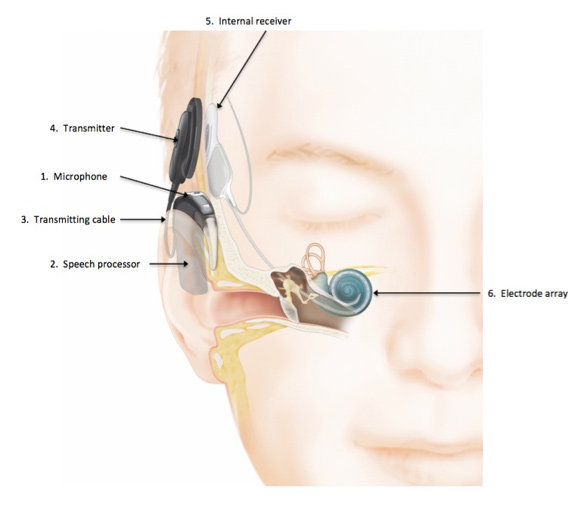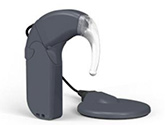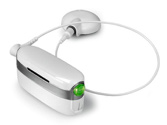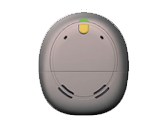What is a cochlear implant?
A cochlear implant is a specialized hearing device that allows individuals with significant hearing loss to perceive sound and to better understand speech. The cochlear implant electrically stimulates nerve cells in the inner ear (cochlea) which then sends the signals up the hearing nerve to the brain. In doing so, the cochlear implant bypasses the problem affecting people with significant hearing loss that prevents them from benefiting from hearing aids.
How does a cochlear implant work?
There are two parts to a cochlear implant; an external component that consists of a microphone, speech processor and transmitter, and an internal component that consists of a receiver/stimulator and electrode array.
The implant works in the following way.
- The microphone picks up sound and sends it to the speech processor.
- The speech processor analyzes and codes the signal
- The coded signal is sent to the transmitter
- The transmitter sends the signal across the skin via a magnet to the internal receiver/stimulator
- The internal receiver /stimulator sends the signal to the electrode array in the cochlea
- The electrode array stimulates the auditory nerve and the signal is sent to the brain.
The internal component is placed by a surgical procedure and is in position at all times under the skin. After surgery, the external component is programmed for the patient. It is worn similar to a hearing aid with the person placing the external device in the morning and removing at night before going to bed. The external device is usually worn as an ear level processor that sits behind the ear, or for very young children, a body worn processor may be used. Newer speech processors sit entirely on the head, alleviating the need for anything on or in the ear.
Are there different types of cochlear implants?

There are three basic types of speech processors:
- Over the ear: the speech processor is worn over the ear and connected to a wire and coil that transmit the signal to the internal portion of the device.
- Body worn devices: the speech processor is worn on the body and attached to a long cord that connects to a device on the head. The signal is delivered to the internal piece through the wire and the piece on the head.
- Head worn device: the speech processor and transmitter are encased in one small device that is placed on the head.
Med-El
Over the ear device
Advanced Bionics
Body worn device
Cochlear Corporation
Head worn device
Who is a potential candidate for a cochlear implant?
- Children 12 months (younger in some cases) to 18 years of age and adults who have severe to profound hearing loss and poor speech understanding skills.
- Adults with mild to moderate low frequency hearing loss and severe to profound sensorineural hearing loss may be candidates for “hybrid” devices.
- Individuals who receive limited benefit from properly fitted hearing aids.
- Potential cochlear implant recipients must have appropriate expectations and be willing to commit to follow-up and therapy as needed.
- Children must have access to appropriate educational and therapeutic resources and a family commitment to adhere to recommendations and follow-up.
- Individuals with no medical contraindication to surgery.
How do I know if I am a cochlear implant candidate?
Evaluation for cochlear implantation is performed by the cochlear implant team which includes the following team members.
- Neurotologist (ear surgeon subspecialist):
- The neurotologist performs a thorough case history and physical examination.
- In addition, the doctor orders radiologic studies, such as CT scan and/or MRI scan to evaluate the integrity of the inner ear and auditory nerve.
- The physician may refer you to other medical specialists or for additional testing, as indicated.
- If approved for cochlear implantation, the neurotologist performs the implant surgery and provides regular medical care for the implant long term.
- Audiologist:
- The audiologist performs a basic audiologic assessment to confirm your hearing levels.
- Electroacoustic evaluation is completed of your hearing aids to determine if they are in good working order and appropriate for your hearing loss. In some cases, you may be fitted with different hearing aids, at least for the cochlear implant evaluation.
- Testing is performed to measure your hearing levels with the hearing aids and to measure your ability to understand speech.
- Speech/Language Pathologist:
- The speech/language pathologist evaluates all children undergoing evaluation for cochlear implantation. The purpose of the evaluation will be to measure your child’s ability to understand and use spoken language and/or visual methods of communication.
- An evaluation may be recommended for some adults, especially those with a long standing history of significant hearing loss or those with other neurodevelopmental disabilities.
- Team meeting:
- After all of the evaluations are completed, the team members meet to discuss the test results and final determination of candidacy is made.
- If approved, you will be scheduled to meet with the audiologist to discuss device options.
- You will also be contacted by the office staff to discuss possible surgical dates and pre-authorization for surgery.
What happens at surgery?
- Surgery takes less than two hours for placement of the implant and testing of the device.
- Almost all patients go home the day of surgery.
- You will be given pain medication for expected mild-moderate pain in the first few days after surgery.
What happens after surgery?
- Most people go home the day of surgery and return to the physician’s office one week post-op.
- You will not hear until the external portion of the device is activated and “mapped” or programmed. This is usually done 3-4 weeks after surgery. The purpose of the mapping is to set the device to maximize your ability to hear soft sound and to tolerate the new auditory input. The initial appointment is typically two hours long. You will return for follow-up one week later and then every 1-3 months during the first six months and then every 6-12 months thereafter.
- Many adult recipients find that they acclimate easier and quicker by participating in aural rehabilitation. The speech language pathologists will provide activities to help you learn to better use your cochlear implant.
- All children with cochlear implants must receive speech and language therapy and educational support. The cochlear implant team will help select appropriate placements and resources. Our speech/language therapists are available for ongoing therapy and assessment.
Do I need any other listening equipment?
Many individuals find that they can further improve their ability to understanding spoken language by using other types of technology in conjunction with their cochlear implants. Some examples may include:
- Amplified and/or closed captioned phones.
- Remote microphones. The three cochlear implant manufactures have devices that “stream” sound directly from another person or directly from an audio source (such as a TV or radio) to the cochlear implant. These devices improve the user’s ability to hear from a distance and/or to hear in noisy or reverberant environments.
- Bluetooth streaming. Audio output from a Bluetooth enabled device, such as a cell phone or computer, can be directly streamed to your cochlear implant speech processor. This allows for hands free talking on the phone and better speech understanding of electronic devices.
- Waterproof options. Waterproof sleeves or covers allow you to use your cochlear implant speech processor in the bath/shower or when swimming.
What do I do if I am interested in learning more about a Cochlear Implant option for myself or a loved one?
Call 914 693 7636 and request a consultation for a Cochlear Implant. You will be scheduled for an appointment to meet with one of our neurotologists to discuss cochlear implant technology and take the next steps for testing if desired.



